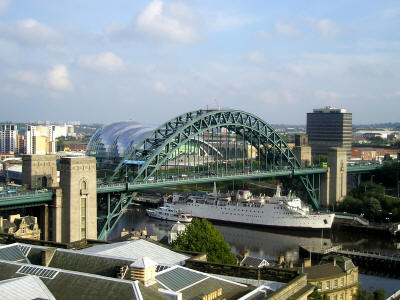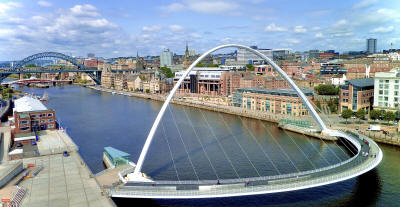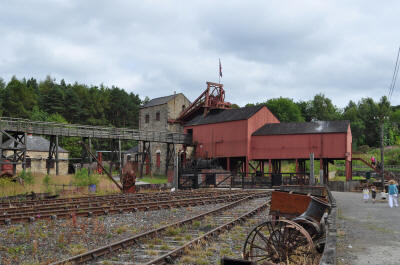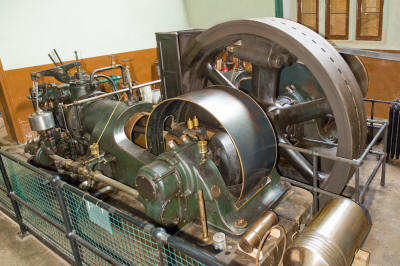|
AIA Summer Tour July 4th - 7th 2024 The North East of England 3 nights from £385 Discount for AIA members Tour is now full Email to join waiting list for cancellations Or how about joining the Spring Tour ? |
|
 |
Industrial activity in the North East of England based on abundant minerals such as salt and coal goes back more than 2,000 years and the area was known for alkali production, salt making, glass manufacture, ship building and of course coal mining before the industrial revolution.
As manufacturing boomed from the 18th Century through to the mid-20th Century all these industries expanded and some of the best known engineers, scientists and inventors worked in or were associated with the area including celebrated names such as Sir Humphry Davy, George & Robert Stephenson, William Armstrong, Charles Parsons, Joseph Swan and many others. |
|
This short tour hopes to uncover some parts of this history. Full details of costs are included below. Non-AIA members are most welcome but paid-up members of the AIA at the time of the tour enjoy a £20 discount per booking, one of the many benefits of becoming a member. With this discount and if you take advantage of the new online-only AIA membership, you will recoup almost all of your membership fee. Join the AIA now |
|
| ITINERARY | |
| Some of the visits are still subject to confirmation. We cannot at this time guarantee that they will all be included but we will make every effort to do so or find suitable alternatives. The order of visits may also change. Changes to the itinerary will be passed on to you before the final invoice is presented. | |
|
Thursday Members of the group make their own way to Newcastle. 19:00 3 course buffet dinner and overnight at our hotel in Newcastle 20:00 Illustrated talk by Dr Michael Bailey: LOCOMOTION No.1, the locomotive that opened the Stockton & Darlington Railway. | |
|
Friday Tour members may choose either Tour A or B – numbers are limited on both tours. Tour A: Cragside & Cragend Farm |
|
|
|
In the morning we will be ‘Gannin alang the Scotswood Road past Airmstrang’s factory’ (at least where it used to be) before turning north to visit Cragside, well-known as the home of William, Lord Armstrong, the first house in the world to be lit by hydroelectricity. Armstrong, born 1810, was essentially fascinated by scientific enquiry but recognised that it had to be directed towards practical purposes. His first success was in the field of hydraulics, particularly the development of the hydraulic accumulator as a means of increasing water pressure for lifting heavy weights. |
|
He went on to work with the technology of large guns and finally warships, so that by the end of the century his only rival in the field was Krupp of Essen.
At Cragside we hope to be able to see the Powerhouse and the turbine and generator (left) which supplied the electricity and members of the group will then tour the house itself looking out for many of Armstrong’s innovations. The tour will be led by Prof. Marilyn Palmer |
|
|
After lunch at Cragside (own expense) we will visit Cragend Farm. Armstrong bought the farm in the 1860’s as part of a grand scheme to create a Model Farm to showcase his prize cattle and innovative water powered hydraulic machinery that worked threshing machines and milling devices but it was not transferred to the National Trust with the rest of the Cragside estate.
We will be given a guided tour of the farm including the two Turbines, a weighbridge and hydraulic Jig in situ on the farm. One of the hydraulic turbines was discovered below 4 feet of pig slurry and has provided a great deal of new information about the engineering of the Cragside Estate. We can also see an agricultural weighbridge bought by Armstrong from H Pooley Ltd which has been fully restored and is believed to be the only one of its kind remaining in the UK. Refreshments will be served at the end of the afternoon (included). Tour B: Tyneside walking tour and the Bowes Railway | |
|
In the morning we will visit the Bowes Railway for a guided tour. Bowes Railway Co, first known as Springwell colliery and railway, was built to carry coal from Springwell and other pits in north west Durham to the Tyne at Jarrow. The earliest section was designed by George Stephenson and opened in 1826. It was 15 miles long when completed in 1855. Each end was locomotive worked; the six mile middle section consisting of rope worked inclines with very steep gradients.
At its peak, the Railway handled over 1 million tons of coal per year and remained virtually intact until 1968. Between 1968 and 1974, most of the line was closed until only the last 3.5 miles between Monkton and Jarrow staithes were operated by the National Coal Board. However, the original 1826 section between the Black Fell bank head and Springwell bank head was acquired for preservation in 1976 by Tyne and Wear County Council. This included Blackham’s Hill West and East inclines, which had been operated by a stationary haulage engine, thought to be the only preserved standard gauge rope hauled railway in the world. After the visit the coach will return to the hotel. There is free time for lunch (own expense). |
|
 |
In the afternoon we have organised a walking tour to see the Tyne bridges and many other nearby features such as the Water Tower at Newcastle Central Station, the Offices, Boiler Shop and Workshop of Robert Stephenson & Co, where “Rocket” was built, and several other buildings and sites which are part of Newcastle’s Industrial History.
Full notes will be supplied and a running commentary will be given as we walk. There will be a coffee and comfort break at during the walk. |
| 3 course buffet dinner and overnight at our hotel in Newcastle | |
| Saturday | |
 |
In the morning In the morning we will visit Beamish which was the vision of Dr Frank Atkinson, the Museum’s founder and first director.
Frank had visited Scandinavian folk museums in the early 1950s (as the AIA has done more recently in Sweden and Hungary) and was inspired to create an open air museum for the North East.
He realised the dramatically-changing region was losing its industrial heritage. Coal mining, ship building and iron and steel manufacturing were disappearing, along with the communities that served them. Frank wanted the new museum to “illustrate vividly” the way of life of “ordinary people” and bring the region’s history alive. |
| We have arranged for a “behind the scenes” Stores and Workshop guided tour led by Paul Jarman, Director of Development – Transport, Industry & Design. This will be followed by time to explore the rest of the museum individually and take lunch at any of the available outlets (own expense). | |
|
After lunch we will visit the Derwentcote steel furnace.
This rare furnace played a crucial role in the British steel industry for about 150 years.
Built around 1730, it converted wrought iron, imported from Sweden, into ‘blister’ steel to be made into cutting tools.
As part of a network of iron and steel producers along the Derwent Valley, Derwentcote Furnace helped to produce the finest steel in Europe and to power the early Industrial Revolution.
It is one of the last surviving pieces of evidence for cementation steelmaking in north-east England.
We have arranged a guided tour which will include the interior of the furnace, not normally open to the public. We will be led by an English Heritage guide and Prof. Marilyn Palmer. 3 course buffet dinner and overnight at our hotel in Newcastle |
|
| Sunday | |
| In the morning we will visit the Shildon Museum, now officially ‘Locomotion’, which is the home of that original locomotive and allows us to see highlights of the national collection of railway vehicles in the world’s first railway town. The town of Shildon is part of the story of the earliest days of the rail industry, a starting point to discover how the railways changed all our lives. We will enjoy a guided tour arranged specially for the group. | |
 |
After lunch (included) After lunch at Shildon (included) we will visit the
Tees Cottage Pumping Station for a guided tour exploring the whole site.
We are sorry to say that the beam engine will not be ‘in steam’ for our visit but we are assured that the 1914 Hornsby Gas Engine (left) and associated Petrol Engine should be operational as should a number of the smaller engines.
In addition, the Blacksmiths should be present to demonstrate their skills and our Cottage Tea Room will be open to provide light refreshments (included). |
| At the end of the visit the coach will drop at Darlington Railway Station before returning to Newcastle. | |
| ACCOMMODATION | |
|
We are staying at The Leonardo Hotel (Formerly Jurys Inn), Scotswood Rd, Newcastle upon Tyne NE1 4AD The hotel is 0.3 miles, 7 minutes, level walk from Newcastle Railway Station. |
|
| TRANSPORT | |
|
The tour starts and ends at our hotel in Newcastle with an option to leave the tour at Darlington Station after the last visit on the Sunday afternoon.
We leave you to make your own travel arrangements to and from Newcastle to suit your own convenience and use of alternative departure points. Travel during the tour will be by luxury, air-conditioned coach. Detailed joining instructions will be supplied about two weeks before the start of the tour. All site visits will include some walking which may include stairs. | |
| COST | |
The cost of the trip is
£385 per person sharing with a single supplement
£130. The supplement represents the additional cost applied by the hotel for single occupation of a double room. The cost includes:
Friday Tour B - £5 Paid-up members of the AIA at the time of the tour enjoy a £20 discount per booking. (So you can book now and claim the discount as long as you join before the tour). The discount will be calculated on your invoice when it is issued. Apart from the discount available on Heritage of Industry tours AIA members enjoy a range of benefits which are shown on the Membership page of the AIA website where you can also find full details of how to join: https://industrial-archaeology.org/membership/ An AIA member joining this tour will already have recouped half of the standard AIA membership fee and more than the online-only membership but, more importantly, the support members give enables the AIA to continue its work, so why not join now? | |
| CANCELLATION CHARGES, HEALTH & INSURANCE | |
|
Please note that cancellation charges will apply from
9th My 2024 and, although these will be modified to the extent that costs are not actually incurred, you are strongly advised to insure against the need to cancel and to cover medical treatment and repatriation charges in the event of illness etc.
| |
| BOOKING | |
|
Booking and management of this tour has been entrusted to Heritage of Industry Ltd which is run by Bill Barksfield. Bill is Overseas Tour organiser on the AIA Council and will accompany the tour. If you have access to an internet connected computer and use email please make your booking online. In the event that you are unable to use a computer then please fill in the attached form and post it to us at the address below. If you give an email address on your application then confirmation and all subsequent communications with you will be by email. Bookings will be taken on a first-come, first-served basis, subject to space availability. Booking is subject to a minimum of 35 and a maximum of 50 people. Book as soon as possible and by 9th May 2024 to ensure a place but please feel free to enquire after that date if a place is still available. We will contact you as soon as possible to confirm the booking and to issue an invoice for the balance of the price. Invoices for the balance of the price will be issued about 8 weeks before the tour starts. You are advised not to make contingent travel arrangements until we have confirmed that the minimum number of people required to operate the tour has been reached. We will inform you as soon as the minimum is reached. A non-refundable deposit of £40 per person is required on booking. Bookings can be made definite only when the booking details and deposit are received and accepted in writing/email by Heritage of Industry Ltd. The company's standard terms and conditions apply. The balance of the price is to be paid to Heritage of Industry Ltd on presentation of the invoice. All monies paid to Heritage of Industry Ltd will be held, in accordance with government regulations**, in a customer protection account until the tour is complete so that your money is safe no matter what happens. We are pleased to announce that we are now able to take debit/credit card and GooglePay payments. Payment may also be made via your bank’s online banking facilities, the necessary details are shown on the booking form. Please send an email note when you have made payment in this way. We prefer not to handle cheques for payment. Tour is now full Email to join waiting list for cancellations Or how about joining the Spring Tour ? ** The Package Travel, Package Holidays and Package Tours Regulations 1992 (SI 1992 No. 3288) |
|
